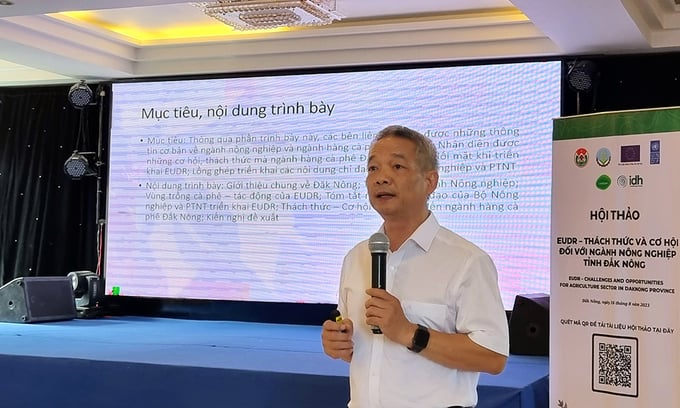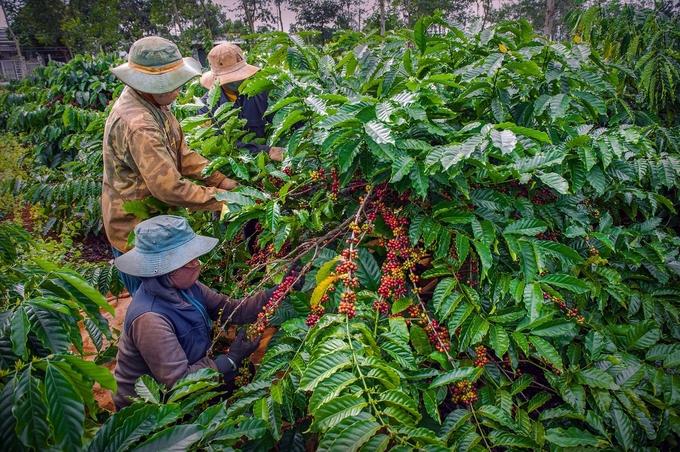June 17, 2025 | 13:26 GMT +7
June 17, 2025 | 13:26 GMT +7
Hotline: 0913.378.918
June 17, 2025 | 13:26 GMT +7
Hotline: 0913.378.918

Pham Tuan Anh, Director of the Dak Nong Department of Agriculture and Rural Development spoke at the seminar on August 15.
At the seminar "EUDR (European Anti-Deforestation Regulation) - Challenges and opportunities for the agriculture sector in Dak Nong province”, Pham Tuan Anh, Director of the Dak Nong Department of Agriculture and Rural Development, said, The Department has issued a document directing affiliated units to have proactive solutions in agricultural production and business to meet new requirements.
While waiting for the direction of the relevant ministries and branches, the Department of Agriculture and Rural Development actively accelerates the agricultural sector's digital transformation, prioritizing building and integrating the coffee, pepper, and rubber database. Also, strengthen the management and protection of forests, promptly inspect, detect, and make records to handle illegal deforestation.
Re-system and ready to provide relevant information on location, area, violators for illegal deforestation after December 31, 2020, for source traceability agricultural products, timber, and wood products when exported to Europe or at the competent authority's request.
The Department of Agriculture and Rural Development also advises developing a plan to grant and manage planting area codes. Simultaneously, advise Dak Nong Provincial People's Committee to develop programs and roadmaps to form raw material areas associated with commodity chains, prioritizing EUDR-related products in the immediate future.
With more than 40 ethnic groups and a population of approximately 700,000, Dak Nong has 50% agricultural land and 45% forestry land. Dak Nong is a raw material area for many valuable export products such as coffee, pepper, rubber, and cashew nuts. Coffee alone accounts for nearly 20% of the country's coffee production.
To sustainably develop commodity groups in Dak Nong, from mid-2022, the Ministry of Agriculture and Rural Development (MARD) has coordinated with the United Nations Development Program (UNDP) to launch the “Integrated sustainable landscape management through deforestation-free jurisdiction project in Lam Dong and Dak Nong" (iLandscape Project).

Coffee is considered the main agricultural product of Dak Nong province.
The project is implemented for four years, from 2022 to 2026, with the goal 2026 of 25,000 hectares of natural forests to be protected, reducing emissions equivalent to approximately 3 million tons of CO2, while improving livelihoods for 35 % of the population in 2 provinces, especially ethnic minorities, and women; and enhance sustainability in production to increase the value of crucial commodities by 25%.
The project's budget is EUR 5 million, funded by the EU through UNDP in Vietnam. In addition, four international organizations provided technical assistance to the project: the International Center for Tropical Agriculture (CIAT), the European Forestry Institute (EFI), the Sustainable Trade Initiative (IDH), the Sustainable Trade Initiative (IDH), and the United Nations Environment Program (UNEP).
Focusing on the coffee industry, the workshop revolved around six main topics: European Anti-Deforestation Regulation (EUDR); the potential impact of the EUDR bill on Dak Nong's agricultural sector; solution; Cooperation mechanism; communication strategy and the role and participation of stakeholders when participating in EUDR implementation.
The iLandscape project is supporting the Ministry of Agriculture and Rural Development and the two provinces of Dak Nong and Lam Dong in applying the approach to sustainable development without causing deforestation, especially in implementing the new EUDR regulation of the European Union. Europe.
According to experts attending the seminar, EUDR directly affects Vietnam's primary export industries. For coffee, EUDR offers opportunities for Dak Nong. The province's long-standing coffee-growing method creates a solid basis for accepting sustainable growth. In addition, forest areas and agricultural production are managed by EUDR principles. Implementing the digital farming transformation project is a step in the right direction to meet the needs of EUDR in the industry.
Besides, Dak Nong coffee also comes with several challenges. It is of utmost importance to strictly implement household farming regulations throughout the coffee-growing region and its adaptation to EUDR requirements. The EUDR's ability to trace and navigate standards quickly, with limited resources, is undoubtedly hampered by the need for more data.
The Council of Europe has just passed the Regulations Bill governing the import and export of goods and products linked to deforestation and forest degradation (EUDR). Accordingly, the EU will ban the import of agricultural and forestry products with production processes on land originating from deforestation, causing forest degradation from December 31, 2020, including cattle breeding, cocoa products, coffee, palm oil, rubber, soybeans, and wood...
EUDR is expected to apply from December 2024 for import and export operators and from June 2025 for small and medium enterprises.
Translated by Tu Quyen

(VAN) A cutting-edge farming technique being implemented on an experimental ranch in Arizona's Sonoran Desert has already saved a billion gallons of water over five years, according to Civil Eats.

(VAN) Poultry and pig production and the environment can be boosted through enhanced water technology, according to new research.
![Turning wind and rain into action: [4] Bringing climate bulletins to remote and isolated areas](https://t.ex-cdn.com/nongnghiepmoitruong.vn/608w/files/linhnhp/2025/06/14/1152-z6704423696987_15fd32ffc26d590d204d520c9dac6786-nongnghiep-151141.jpg)
(VAN) The Vietnam Agriculture and Nature Newspaper interviewed Mr. Vu Thai Truong, Acting Head of Climate Change and Environment at UNDP Vietnam, to gain deeper insight into how climate bulletins are delivered to farmers.

(VAN) In Tien Giang, a high-tech shrimp farm has developed a distinctive energy-saving farming model that has yielded promising results.
![Turning wind and rain into action: [3] 300.000 farmers benefit from agro-climatic bulletins](https://t.ex-cdn.com/nongnghiepmoitruong.vn/608w/files/news/2025/06/12/e5a48259d6a262fc3bb3-nongnghiep-125122.jpg)
(VAN) The agro-climatic bulletin has become a valuable tool for farmers in the Mekong Delta. After more than five years of implementation, the initiative is gradually being expanded nationwide.
![Turning wind and rain into action: [2] Providing forecasts to the people](https://t.ex-cdn.com/nongnghiepmoitruong.vn/608w/files/news/2025/06/12/e5a48259d6a262fc3bb3-nongnghiep-103927.jpg)
(VAN) In addition to improving the quality of hydrometeorological forecasts, putting forecast bulletins into practical use is crucial for production and disaster prevention.

(VAN) Blue carbon is receiving attention for its rapid absorption capacity and vast potential. It represents a promising nature-based solution to respond to climate change.